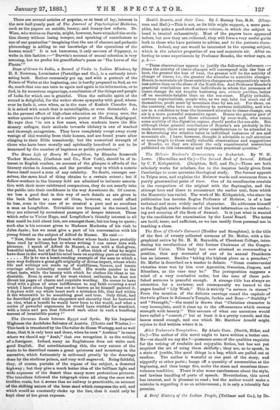The Home Life of Henry W. Longfellow, by Blanche Roosevelt
'Tucker Machette, (Carleton and Co., New York), should be of in- terest to English readers, on account of the glimpse it affords of the literary circles in America, and the peculiar way in which a coterie forms itself round a man of any celebrity. No doubt, amongst oar- selves, the same kind of thing obtains to a certain extent ; but if fellow-workers in the literary field are admitted to intimate associa- tion with their more celebrated companions, they do not usually take the public into their confidence in the way Americans do. Of course, we lose a good deal in this way of such details as are given in the book before us ; some of them, however, we. could afford to lose, even in the case of so musical a poet and so excellent a man as Longfellow. Trivialities are frequent in the record, but they are relieved by occasional passages of deeper interest. Those which refer to Victor Hugo, and Longfellow's friendly interest in all that could be told about him, are amongst these, but too long to quote ; such also is his account given to Madame Machetta of his visit to -Jules janin; but we must give a part of his conversation with his young friend on the subject of Alfred de Musset. He said :—
"Now, there is another French writer whose books have probably been read by millions, but to whose writing I can never tarn with pleasure. I speak of Alfred de Masset, a man with a God-given, beautiful talent, but all for the bad. I often think of what he might have done in the world bad his mind been on anything pure or virtuous. . . . . He is to me a heart-rending example of the Imes to which a man may dedicate a great gift originally of divine import, whose whole life and writings are made up of worldliness, licence, and innate cravings after unhealthy mental food. His words pander to the vilest taste, while the beauty with which he clothes his ideas is un- deniable. Even in some of his most violent outbursts, he does not divest his pages of charm and exquisite wording. He seems to have lived with a gloss of utter indifference to any faith covering a soul which I have often hoped was not so barren as he himself painted it. I deplore with my whole heart such a mistaken life, that had within it the wherewith to be something good and tine. Only think, had he described good with the eloquence and sincerity that he bestowed on vice, what a benefit he would have been to the world, and what a series of powerful arguments he would have wielded for mankind, with a brain and pen that followed each other, in such a headlong torrent of irresistible poetry !"






































 Previous page
Previous page